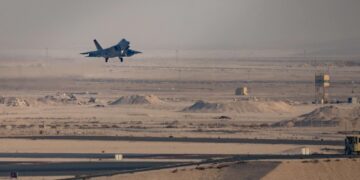April 23, 2024
Failed U.S. foreign policy principles led to Iran-Israel escalation

Israel and Iran recently exchanged direct fire on each other’s sovereign territories, marking a historic escalation between the two regional rivals at a time of intense instability in West Asia. While the latest Israeli strike on Iran’s central city of Isfahan on April 19 could be an attempt to de-escalate while saving face, the risk of a broader regional war with global implications remains unacceptably high. Fighting in Gaza and renewed strikes on U.S. military positions in Syria harm the prospect of mitigating this risk, highlighting that the best solution to prevent a conflict is an Israel-Hamas ceasefire.
Indeed, Gaza is driving fighting along multiple fronts in what can be described as a regional conflict short of full-blown war. Following an illegal Israeli strike on the Iranian diplomatic compound in Damascus on April 1, Tehran conducted a significant, coordinated attack at Israel proper on April 13 for the first time in their long-running rivalry, launching upwards of 350 rockets, drones, and ballistic missiles at military compounds supposedly responsible for the attack. This led to the April 19 strikes on Isfahan and other parts of the region. Iranian militias likely conducted the later strikes on U.S. positions.
To be sure, the incidents following the Israeli strike on Damascus appear to be calculated to inflict a level of harm short of spurring total war—reflecting strong deterrence considerations. Iranian officials say they warned multiple countries of a pending attack following April 1 in an apparent attempt to allow regional actors and the United States the ability to counter its actions. Similarly, Israel telegraphed vague language in response to that attack amid widespread condemnation of Iran and calls for Israel to “take the win,” according to a call between U.S. President Joe Biden and Israeli Prime Minister Benjamin Netanyahu.
More on Middle East

November 19, 2025

November 19, 2025

November 18, 2025
Events on Middle East






